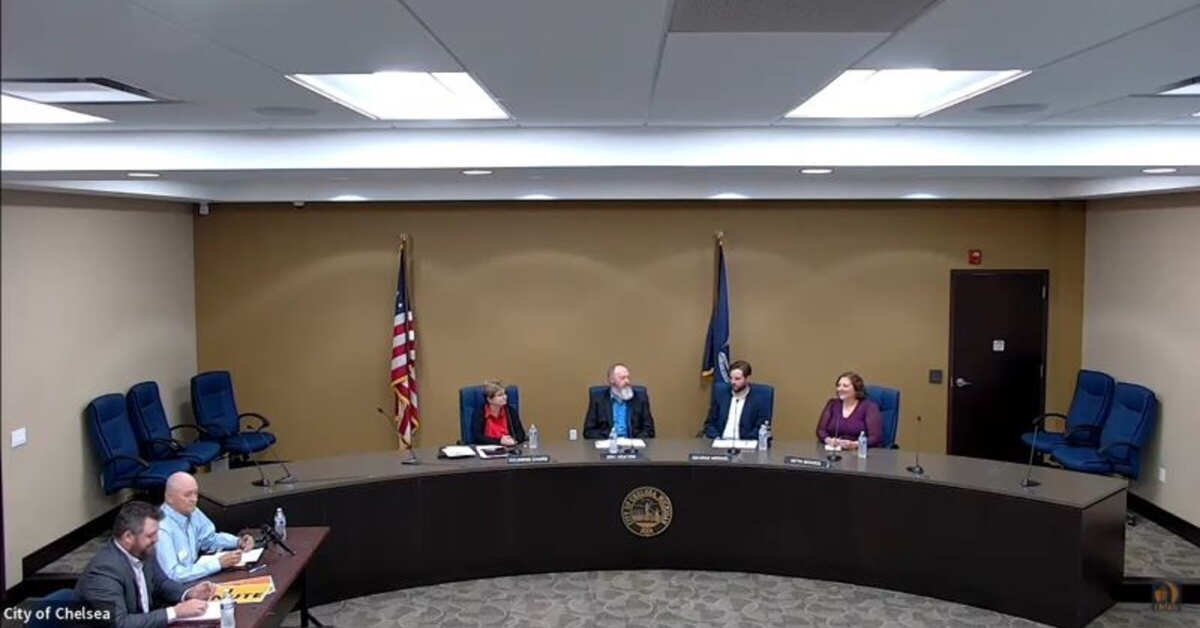Sylvan Township Board to Discuss Marijuana Facilities Expansion

Sylvan Township is set to discuss the potential expansion of marijuana facilities during the upcoming board meeting on Tuesday, October 3rd, at 7:00 pm in the township hall. The discussion was reintroduced by Treasurer Branham, who is exploring the idea as a potential revenue generation source for the community.
Members of the public are encouraged to attend and offer their perspectives. The board has set aside time for public comments at the start of the meeting. For those unable to attend in person, written feedback can be submitted in advance to the Board members:
- Treasurer Branham - [email protected]
- Supervisor Kennedy - [email protected]
- Trustee Schulze - [email protected]
- Clerk Nimke - [email protected]
- Trustee Koseck - [email protected]
In a previous meeting, public comments predominantly opposed the expansion of marijuana facilities. Concerns highlighted potential negative impacts, particularly on the youth of Sylvan Township. Several studies and data were presented, including a fact sheet from SRSLY, suggesting increased young adult marijuana use within proximity to dispensaries. Another pooled analysis linked young adult marijuana use to potential increases in depression, suicidal ideation, and suicide attempts compared to non-users.
Treasurer Branham shared a vision of possibly having a facility on Brown Dr., while Trustee Schulze mentioned the potential benefit for farmers selling land for marijuana cultivation operations. In contrast, Trustee Koseck and Clerk Nimke preferred to remove the topic from the agenda due to previous deliberations and legal considerations.
Given that the use of marijuana by adults is legal in Michigan and available in nearby communities, the primary consideration is to evaluate the benefits and drawbacks of introducing new retail and cultivation operations in Sylvan Township.
The discussion can be organized into three primary concerns:
-
Financial Impact: With potential revenue generation being a primary motivation, it's essential for the Board to provide a comprehensive financial evaluation. This would encompass not only potential earnings but also possible costs, such as litigation or increased law enforcement needs. Comparisons could also be drawn with other development options like housing.
-
Public Convenience: Although several marijuana facilities are within a short drive from Sylvan Township, a local retail outlet could provide more accessible options for residents. The implications of such convenience should be carefully assessed.
-
Impact on Public Health: A central focus is the health and well-being of Sylvan Township's residents, especially its youth. Evaluating potential long-term consequences and the immediate impacts will be vital for informed decision-making.
With the agenda item reintroduced and support from certain board members, the upcoming discussion promises to be comprehensive, weighing the various risks and benefits. The community's involvement is crucial, ensuring that decisions reflect the best interests of Sylvan Township's residents.
Chelsea City Council Elections: Candidates Weigh in on Cannabis Operations

With the General Election approaching on November 7th, Chelsea will see some new members joining the City Council. The seats for Charles Wiseley, Peter Feeney, and Eric Keaton are up for grabs, with Keaton vying for a continued seat after his appointment two years prior.
The upcoming election presents candidates Julianne Chard, George Merkel, Beth Morris, and the aforementioned Keaton, all competing for the three available positions.
The Chelsea Chamber of Commerce recently organized a Candidate Forum on September 21st, aiming to familiarize voters with their potential future council members. The forum's master of ceremonies, Paul Schissler, expressed his gratitude to the candidates, emphasizing the importance of the roles they're aiming for: "Chelsea City Council is not a casual volunteer job but one for skilled, thoughtful people genuinely concerned about our city."
One of the focal points during the forum was the city's perspective on cannabis operations, especially given the ongoing dialogue in neighboring townships. Here's a summarized view of what each candidate had to say:
Julianne Chard:
- Feels Chelsea's proximity to Ann Arbor provides ample access to cannabis operations.
- Though recognizing its potential as a revenue generator, Chard argues that the city prioritizes family-centric values.
- Believes further cannabis establishments don't resonate with Chelsea's present ethos.
Eric Keaton:
- Maintains a neutral standpoint on personal cannabis consumption.
- Considers additional operations in Chelsea redundant due to neighboring availability.
- Raises concerns about the impact on the city's intrinsic charm.
George Merkel:
- Is open to considering it if backed by public sentiment.
- Notes the abundance of cannabis outlets in adjacent areas.
- Promises to respect public opinion, pledging to base his stance on the residents' collective decision.
Beth Morris:
- Acknowledges the therapeutic attributes of cannabis.
- As a mental health expert, she's conscious of the potential behavioral and substance-related risks, predominantly among the youth.
- Advocates for thorough research and assessment before greenlighting any cannabis ventures in Chelsea.
With the election looming, the city's stance on cannabis operations will certainly be a topic of interest for many Chelsea voters. As the candidates lay out their positions, the decision now rests in the hands of the residents.
For those interested in gaining a comprehensive understanding of the discussions and questions posed to potential city council leaders, the full hour-long video of the meeting is available for you to watch:
55 Months in Prison: The Price Rick Johnson Pays for Bribery

In a landmark bribery case, former Michigan House Speaker Rick Johnson was handed a 55-month federal prison sentence on Thursday. Johnson, 70, from LeRoy, Michigan, faced charges for accepting bribes totaling over $110,200, including liaisons funded by lobbyists, during his tenure as chairman of Michigan's emerging medical marijuana licensing board.
The bribes, facilitated by Detroit businessman John Dawood Dalaly and Lansing lobbyists Vincent Brown and Brian Pierce, were in exchange for Johnson's aid in expediting their business applications, divulging confidential board deliberations, and influencing approvals. He accepted cash payments, a "loan", services from an adult entertainment worker, and private jet trips to confer with Canadian investors.
The legal proceedings have raised questions about the fairness and transparency of the state's marijuana licensing process. U.S. District Judge Jane Beckering, overseeing the case in Grand Rapids, recently sentenced Dalaly to a 28-month prison term. While Johnson and his accomplices pleaded guilty in April, with hints of further indictments, no additional charges have surfaced.
Prosecutors highlighted the case's significance, noting, "Johnson's crime has severely undermined trust in his role as MMLB Chair and in state governance."
Johnson's attorney, Nicholas Dondzila, advocated for a lighter sentence, highlighting Johnson's cooperation with the investigation, his public service, and clean prior record.
Johnson's political stint began in 1971 as the Rose Lake Township treasurer, advancing to a five-year term in the state House and culminating as the House Speaker from 2001-2004. His subsequent role in a lobbying firm and controversial appointment to the marijuana board by then-Gov. Rick Snyder, given his prior ties to the industry, drew public scrutiny.
The remaining lobbyists, Pierce and Brown, await their sentencing on October 18th.
Marijuana Dispensary Burglar on the Loose in Grand Rapids

The Grand Rapids Police Department is urgently seeking the public's assistance in tracking down a prime suspect linked to a spree of break-ins across West Michigan. The string of burglaries has particularly targeted marijuana dispensaries, highlighting the growing concerns surrounding cannabis store security in the region.
Nehemiah Chilton, aged 18, is suspected of orchestrating over 30 break-ins, prominently at cannabis dispensaries and liquor outlets in Grand Rapids, starting in July. His most recent suspected involvement was reported earlier this week.
Beyond Grand Rapids, Chilton is also on the wanted list for similar criminal activities spanning Kent County, as well as the Portage and Kalamazoo regions. Notably, he is believed to have purloined nine vehicles within Grand Rapids, subsequently using them to facilitate his burglary operations.
While the Grand Rapids Police have successfully detained and charged three accomplices linked to Chilton, he remains at large. The public is cautioned against approaching Chilton directly due to potential risks.
Anyone possessing relevant information or who might have clues about Chilton's location is strongly encouraged to reach out to Grand Rapids detectives at 616-456-3380. For those wishing to provide tips anonymously, the Silent Observer can be contacted at 616-774-2345 or visited online at www.silentobserver.org.
Momentum for the SAFER Banking Act and What It Means for Cannabis in Michigan and Beyond

The SAFER (Secure and Fair Enforcement Regulation) Banking Act is making significant strides in the United States Senate, indicating bipartisan support to usher state-legal marijuana businesses into the financial mainstream. This transformative move could eliminate the current cash-only conundrum many cannabis businesses face, bolstering safety and operational efficiency.
Support us as a patron to access this exclusive article.
While we're reluctant to put content behind a paywall, we value our patrons by offering exclusive content just for them. Rest assured, our core mission of providing unbiased news stories remains accessible to all. Our aim is to deliver informative content with minimal ads, and your support means the world to us.
View our PatreonMichigan's Cannabis Genetics Leader, Prima, Unveils Its Aviator Seed Line

Prima, a cannabis genetics firm based in Bay City, Michigan, announced today the launch of its new Aviator seed line. Previously known for its role in the commercial cannabis genetics market in Michigan, Prima is now extending its seed products to the broader U.S. market through its online platform.
Nate Niehuus, the founder of Prima, has a background as a disabled combat veteran. He mentioned, "We have invested in extensive research over the years, which has contributed to our collection of cannabis genetics. Our approach, combined with our Clean Stock Program, positions us to share these genetics with the seed market."
Prima's goal is not only to supply seeds but also to provide valuable support to its customers.
Acknowledging the significance of seeds for genetic conservation and evolution, Prima integrates advanced techniques such as tissue culture and simultaneous flowering of multiple varieties. The firm's focus on genetic refinement has led to the development of the Aviator seed line, which features certain qualities like stability and productive flower yield. These photoperiod seeds cater to growers and those interested in breeding.
Prima's approach to cannabis genetics includes tissue culture remediation and partnerships with industry peers. The company plans to introduce more seed types, including feminized and regular photoperiod seeds. The Aviator line is now accessible to the U.S. market.
Niehuus added, "The decision to offer seeds to a wider audience aligns with our broader vision. Seeds hold a special place in the cannabis genetics community."
In the cannabis industry, genetic IP is crucial for various stakeholders. A comprehensive genetics program can offer advantages that some operators might not yet have.
Midnight Wash Co, a company in the cannabis sector, shared their experience: "We've had a positive experience cultivating with Prima's plants. The announcement of their seed availability got our attention."
Looking ahead, Prima is considering several niche breeding projects, with an emphasis on quality across different cannabis product categories. They aim to maintain a high standard in cannabis genetics.


 Helpful Links
Helpful Links